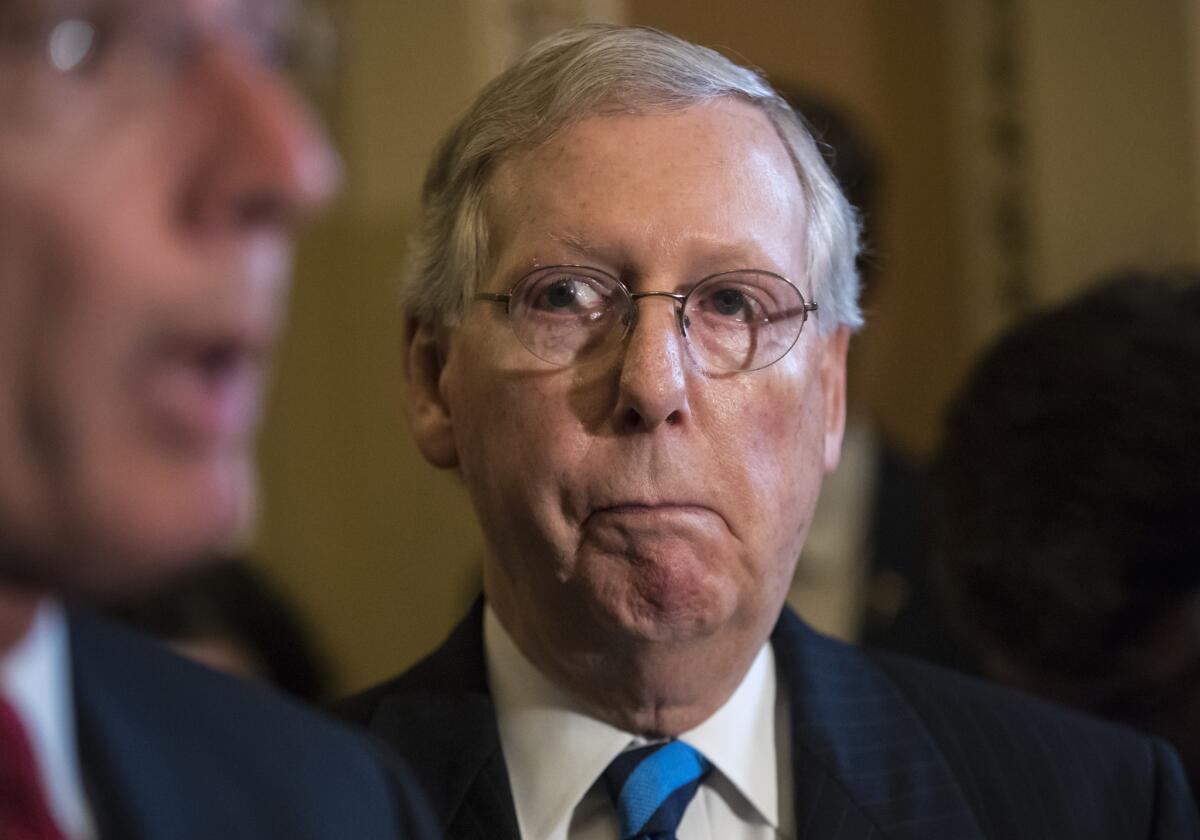Divided Senate Republicans unveil new version of Obamacare repeal bill

- Share via
Reporting from Washington — With their bid to roll back the Affordable Care Act only a vote away from collapse, Republican leaders scrambled Thursday to rally GOP senators behind revised healthcare legislation in hopes of passing it next week.
The new version — which represents Senate Majority Leader Mitch McConnell’s latest bid to unite his fractious caucus — would still enact historic cuts in federal healthcare assistance to low- and moderate-income Americans and fundamentally scale back Medicaid’s half-century-old guarantee of health coverage for the poor.
The revised bill would further loosen insurance requirements to allow health plans to offer stripped-down, cheaper plans, a move designed to win over skeptical conservative senators.
The new approach also includes a provision to expand Americans’ ability to use tax-deferred Health Savings Accounts to pay insurance premiums, which primarily benefits those in higher income-tax brackets.
The bill would earmark an additional $70 billion in federal money to help stabilize health insurance markets across the country, funded in part by preserving two Obamacare taxes on wealthy Americans that the previous GOP legislation eliminated.
And in an effort to woo several GOP senators from states dependent on Medicaid to address the opioid crisis, McConnell earmarked an additional $45 billion in the bill to confront the epidemic.
But Medicaid appeared to remain as a major stumbling bloc for at least half a dozen wavering GOP senators, who met privately with Senate leaders Thursday afternoon to discuss ways to protect poor patients, tens of millions of whom stand to lose health protections in the Senate bill.
McConnell (R-Ky.) has been meeting behind closed doors to adjust the legislation after being forced to abandon a vote last month amid a revolt within his party. Republicans have promised for seven years to repeal Obamacare, but the process is proving more difficult than expected.
The earlier version would have left 22 million more Americans uninsured and has been vehemently opposed by leading doctor, patient and other healthcare advocacy groups.
Several Republican senators said Thursday that they were hopeful the changes to the legislation would allow it to advance, and Texas Sen. Ted Cruz, a conservative who opposed the original bill, said he would support this version.
“I think we’re making good progress,” said Senate Health Committee Chairman Lamar Alexander (R-Tenn.).
But two GOP lawmakers — Sens. Susan Collins of Maine and Rand Paul of Kentucky — said they would still vote no. A number of other key lawmakers remained undecided. Every Democrat is expected to oppose the bill.
With 52 members in his caucus, McConnell can afford to lose only two votes and still advance the legislation. Passage remains uncertain, and many senators are skeptical that changes they want could be added once formal debate on the legislation begins, as soon as next week.
The new version is still fiercely opposed by many patient advocates and others.
“The latest proposed changes to the Senate healthcare bill would make access to health coverage worse for those with preexisting conditions like cancer,” said Chris Hansen, president of the American Cancer Society’s advocacy arm. “The reluctance by senators to include patient feedback and other relevant stakeholder perspectives in the process is preventing the development of a reasonable, bipartisan consensus that could improve the law and pass the Senate.”
Also critical of the bill was Americans for Tax Reform President Grover Norquist, an influential conservative, who said it was a mistake to retain the two Obamacare taxes — a 3.8% investments tax and a 0.9% payroll tax — on individuals earning $200,000 or more and couples earning $250,000 or more.
“All Obamacare taxes should be repealed,” Norquist said.
It remains unclear whether the new bill would resolve differences between the GOP’s conservative and centrist factions.
In fact, even before the revised bill was released, Republican Sens. Lindsey Graham of South Carolina and Bill Cassidy of Louisiana floated their own rival plan, though it appeared their proposal would not go anywhere.
President Trump told Christian Broadcasting Network founder Pat Robertson in an interview excerpt that aired Wednesday that he wanted Congress to send him a bill to sign.
“I will be very angry about it and a lot of people will be very upset,” Trump said of the measure’s potential failure. Referring to McConnell, Trump added: “Mitch has to pull it off. He’s working very hard.”
But as he traveled to Paris on Air Force One, Trump acknowledged the challenge. “I’d say the only thing more difficult than peace between Israel and the Palestinians is healthcare,” he said.
Some GOP senators are worried their leaders don’t even have the 50 votes needed for a procedural vote to start debate of the healthcare bill on the Senate floor.
McConnell has indicated he intends to push ahead once the nonpartisan Congressional Budget Office has reviewed the revised legislation. The agency’s estimates are expected Monday.
“We will be voting next week,” he told reporters staking out his Capitol office.
McConnell’s challenge now appears to be finding support from more than half a dozen Republican senators who remain concerned about Medicaid, including Sens. Dean Heller of Nevada, Rob Portman of Ohio, Lisa Murkowski of Alaska, John Hoeven of North Dakota and Cassidy. All of them met with GOP leaders late into the afternoon Thursday, with the administration’s top Medicaid official, Seema Verna, on hand to answer their questions.
Senators are looking at providing additional money to states that could be used to help poor patients now on Medicaid buy commercial health plans, according to Hoeven.
Several senators emerged from the Thursday meeting sounding hopeful at the progress.
Portman, the Ohio Republican, said he welcomed the $45-billion fund to handle the opioid crisis as “progress, no question about it.”
“But we still have concerns,” he added.
The revised bill also included key revisions to bring conservatives like Cruz on board.
Cruz won a provision to further loosen requirements on health plans. It would allow insurance companies to offer bare-bones plans that do not include the full set of currently required benefits, such as maternity care and treatment for mental illness and substance abuse.
Conservatives say the change will drive down premium costs for consumers.
But critics say Cruz’s plan essentially does away with Obamacare’s protections for patients with preexisting medical conditions by allowing insurers to charge high rates to sick people who need more extensive coverage and leaving everyone else with skimpy, if cheap, plans that provide inadequate coverage.
Thirteen patient groups — including the American Heart Assn., the American Lung Assn., the March of Dimes, AARP and the American Cancer Society’s advocacy arm — sent senators a strongly worded letter this week lambasting Cruz’s proposal as “a betrayal of the commitment to protect Americans from price discrimination based on a preexisting health condition.”
Twitter: @LisaMascaro and @NoamLevey
ALSO
Trump wants a border wall, but few in Congress want to pay for it
With a push from Trump, House Republicans pass Obamacare overhaul
More coverage of politics and the White House
UPDATES:
3:15 p.m.: This article was updated with additional background and reaction.
12:50 p.m.: This article was updated with President Trump’s comments.
11:30 a.m.: This article was updated with additional reaction.
10:25 a.m.: This article was updated with more information about the revised bill and reactions.
8:55 a.m.: This article was updated with the bill’s release, and additional details and background.
This article was originally published at 3 a.m.
More to Read
Get the L.A. Times Politics newsletter
Deeply reported insights into legislation, politics and policy from Sacramento, Washington and beyond. In your inbox three times per week.
You may occasionally receive promotional content from the Los Angeles Times.












